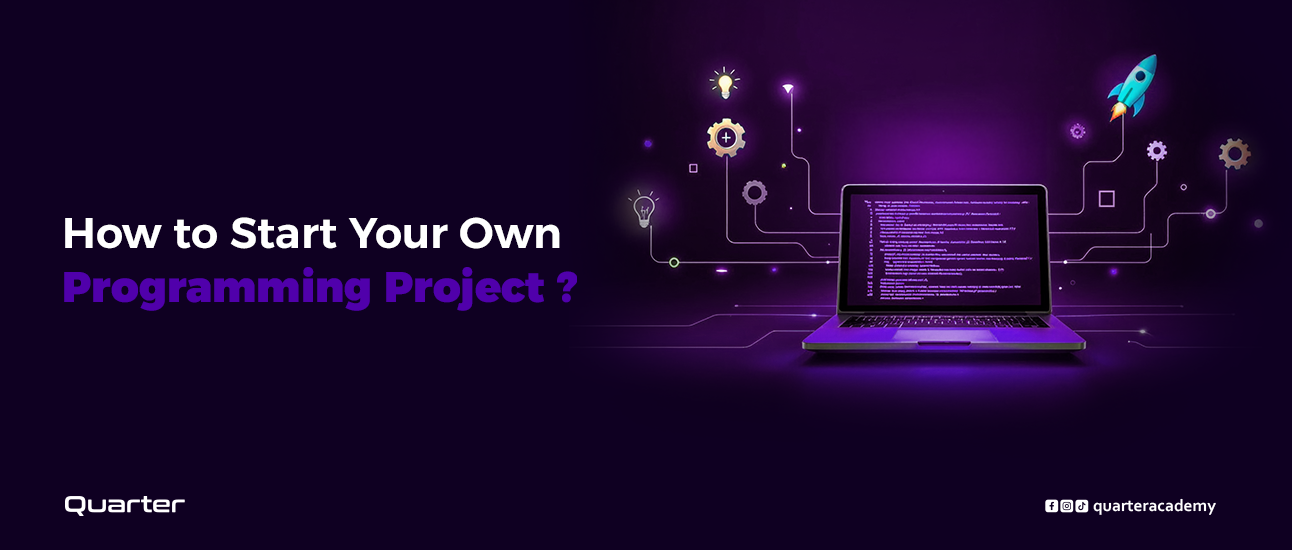How to Start Your Own Software Project?

Thinking of starting your own software project? You're on the right track to enter a world filled with creativity and opportunities. Software projects have become one of the most lucrative and innovative fields, but they require meticulous planning and efficient management. In this article, we’ll guide you step-by-step on how to start your own software project professionally and successfully.
1. Define Your Software Project Idea
1.1 Solve a Real Problem
The best projects solve a genuine problem for customers. Look for gaps in the market or specific needs your software can address. Ask yourself: What problem can I solve?
1.2 Innovation Creates Distinction
Don’t just solve the problem—offer an innovative solution. Make your idea stand out by providing a superior user experience or unique features that add value to your customers.
2. Conduct a Comprehensive Feasibility Study
2.1 Market Analysis
Analyze your target market before starting. Who are your potential customers? What are their needs? Use tools like Google Trends to understand market trends and evaluate competition.
2.2 Estimate Costs and Revenues
Prepare a financial plan that includes expected costs and projected revenues. This helps determine the required investment size and ensures project sustainability.
3. Create a Detailed Business Plan
3.1 Set Goals
Define both short-term and long-term goals. For instance, "Develop an initial version of the app within six months" or "Achieve 500 active users in the first year."
3.2 Develop a Clear Roadmap
Create a timeline that outlines the key milestones for development and launch. Ensure your plan is flexible to accommodate any changes that might arise.
4. Build the Right Team
4.1 Identify Required Skills
Determine the skills needed to execute the project, such as programming, design, and marketing expertise.
4.2 Hire or Partner
Work with a cohesive team of experts or partner with experienced developers. You can also use freelance platforms like Upwork and Freelancer to find the right talent.
5. Develop a Minimum Viable Product (MVP)
5.1 What is an MVP?
An MVP is a simplified version of your project that includes only the core features. It allows you to test your idea with minimal costs.
5.2 How to Develop an MVP?
- Select the most critical features.
- Start by building a simple yet functional version.
- Gather customer feedback to refine the product.
6. Choose the Right Technology
6.1 Programming Languages
Choose the most suitable programming language based on your project’s nature, such as Python for AI applications or Flutter for mobile apps.
6.2 Tools and Platforms
Use tools like GitHub for code management and Slack for team communication.
7. Marketing Strategy for Your Software Project
7.1 Build a Brand
Design a logo and a visual identity for your project that reflects your vision and objectives.
7.2 Digital Marketing
- Create a professional website showcasing your services.
- Use Google Ads and social media platforms to reach your target audience effectively.
8. Launching Your Software Project
8.1 Launch Planning
Set a launch date and promote it beforehand to generate interest from potential customers.
8.2 Managing Challenges
Be prepared to address technical issues or customer inquiries. Quick responses enhance your project’s reputation.
9. Continuous Improvement and Development
9.1 Listen to Your Customers
Collect feedback from users and work on improving the product based on their needs.
9.2 Regular Updates
Release periodic updates to add new features and improve performance.
10. Tips to Ensure the Success of Your Software Project
- Start with a clear and specific plan.
- Invest in building a strong team.
- Be flexible and ready to adapt to changes.
Conclusion
Starting a software project isn’t just about having an idea—it’s a journey that requires vision, planning, and meticulous execution. By following the steps outlined above, you’ll be equipped to build your project confidently and achieve the success you’re aiming for.
FAQs
1. What are the essential skills needed to start a software project?
Key skills include programming, project management, and marketing.
2. How can I ensure the success of my software idea?
Conduct thorough market research and develop an MVP to gather customer feedback.
3. Do I need prior programming experience to start a project?
Basic programming knowledge is helpful, but you can partner with professional developers if needed.
4. What are the best tools for developing a software project?
Common tools include GitHub for code management and Trello for task organization.
5. How long does it take to develop a software project?
The timeline depends on the project’s size and complexity but typically ranges between 6 months and 1 year.
Start your journey now, and remember, success begins with a single step!
Tags
related articles
view all
How to Start Writing Code in Python?
Python is one of the most popular and easiest programming languages to learn, making it a top choice for both beginners and professionals. Known for its simplicity and versatility, Python is a powerful tool in fields like data analysis, web development, artificial intelligence, and more. If you are interested in programming and want to start your journey with Python, this article offers a comprehensive roadmap.
What is Python Programming Language?
Python is a general-purpose programming language designed to be easy to read and understand. Developed in the late 1980s, it has become one of the most widely used languages globally. Python is utilized for creating software applications, building websites, analyzing data, and automating repetitive tasks.
Why is Python the Best Choice for Beginners?
Ease of Learning
Python features simple and straightforward syntax, making it highly suitable for people with no prior programming experience.
Versatility
Python can be applied in various domains, such as:
- Developing applications and websites.
- Analyzing data and managing numbers.
- Artificial intelligence and machine learning.
Large and Supportive Community
Python has a vast global community of developers who provide support, tutorials, and open-source libraries that simplify project development.
Initial Steps to Start Using Python
Installing Python
The first step is to install Python on your computer. Visit the official Python website to download the latest version compatible with your operating system.
Choosing a Development Environment
You don’t need complicated tools to get started. You can use any text editor like Notepad++ or rely on integrated development environments (IDEs) such as PyCharm or Visual Studio Code, which offer features to streamline coding.
Python Basics You Need to Learn
Variables
Variables are the foundation of any programming language. They are used to store values like text and numbers. Learning how to define and use variables is crucial.
Conditions
Conditions allow you to make decisions within the program based on inputs or specific scenarios, forming a vital part of programming logic.
Loops
Loops let you repeat tasks automatically until a certain condition is met. Understanding loops can help you write more efficient code.
Exploring Python Libraries
Built-in Libraries
Python comes with built-in libraries that simplify many common tasks, such as handling dates, performing mathematical operations, and generating random numbers.
Additional Libraries
You can install additional libraries using the pip package manager. Some popular libraries include:
- NumPy for mathematical data analysis.
- Pandas for organizing and analyzing data.
- Django for web application development.
Strategies to Learn Python Effectively
Start with Simple Projects
Begin with small projects like a calculator app or a task management program. These projects help you apply what you learn practically.
Rely on Reliable Educational Resources
Take advantage of books, free online tutorials, and courses available on platforms like Udemy and Coursera.
Join the Python Community
Engaging in Python forums and groups allows you to share experiences and solve challenges you may face.
Common Mistakes and How to Avoid Them
Starting with Complex Projects
Try to start with smaller projects before diving into larger, more complex ones.
Jumping Between Topics
Focus on learning the basics of the language before moving to advanced concepts.
Ignoring Documentation
Python has official documentation rich in information that can help you learn the language more effectively.
Benefits of Learning Python
Wide Job Opportunities
Python is used across multiple industries, making it an excellent investment for your career.
Problem-Solving Tool
Python allows you to automate daily tasks and develop innovative solutions.
Innovation Platform
Thanks to its extensive libraries, Python provides an ideal environment for creating creative ideas in fields like artificial intelligence and data analysis.
Python is one of the best programming languages for both beginners and professionals. Its ease of learning, flexibility, and versatility make it an ideal choice for starting your journey in the world of programming. With dedication and practical training, you can master Python and build great projects that add value to the tech world.
Frequently Asked Questions
1. Is Python suitable for beginners?
Yes, Python is designed to be easy to understand and use, making it perfect for those new to programming.
2. How long does it take to learn Python?
It depends on your level of dedication, but mastering the basics can take about a month with daily practice.
3. What fields can Python be used in?
Python is used in web development, data analysis, artificial intelligence, and game development.
4. Should I learn Python before other languages?
If you’re a beginner, Python is an excellent starting point before transitioning to other languages.
5. Is Python free?
Yes, Python is open-source and free to use for personal and commercial purposes.

5 Tools to Help Beginners in Programming
Programming is a vital skill in today’s digital age. However, as a beginner, you might face challenges that seem overwhelming. Don’t worry! With the right tools and proper guidance, you can become a skilled programmer in no time.
In this article, we’ll discuss 5 tools to help you with programming, the easiest programming language to learn, how to write clean and understandable code, whether coding is worth the effort, and how to solve programming challenges like a pro.
Tools to Help Beginners in Programming
Visual Studio Code (VS Code):
A flexible, free code editor offering an easy-to-use environment. It supports various programming languages and has powerful extensions.
Git & GitHub:
An essential tool for version control and project sharing. It helps you track changes and collaborate on projects with others.
Codecademy:
An interactive learning platform that teaches programming through practical projects.
Postman:
A tool used to test APIs (Application Programming Interfaces) effortlessly.
Stack Overflow:
A community of programmers where you can find answers to any coding challenges you encounter.
What is the Easiest Programming Language to Learn?
For beginners, Python is the best choice. It’s known for its simple syntax and ease of learning, making it perfect for grasping basic programming concepts.
Reasons to Choose Python:
- Easy to learn and understand.
- Versatile for web development, artificial intelligence, and data analysis.
- Supported by a large community offering extensive help and resources.
How to Write Clean and Understandable Code?
Writing clean and understandable code is not just beneficial for you but also makes teamwork more efficient.
Use Clear Variable Names:
Avoid vague names; choose names that reflect the variable's purpose.
Follow Formatting Standards:
Use tools like Prettier to ensure consistent code formatting.
Add Meaningful Comments:
Comments explain the logic behind the code, making it easier to understand later.
Break Code into Small Functions:
Instead of writing long code, break tasks into manageable, small functions.
Is Learning Programming Worth the Effort?
Yes, learning programming is absolutely worth it. Here’s why:
- Job Opportunities: Programmers are in high demand worldwide.
- Improved Thinking Skills: Programming enhances logical thinking and problem-solving abilities.
- Creativity and Innovation: It empowers you to turn your ideas into reality.
Tip: If you’re a beginner, take it step by step and focus on gradual learning.
How to Solve Programming Challenges Like a Pro?
Understand the Problem Thoroughly:
Read the problem carefully before attempting to solve it.
Break the Problem into Parts:
Instead of solving it all at once, divide it into smaller, manageable chunks.
Utilize Available Resources:
Don’t hesitate to search on Google or Stack Overflow for assistance.
Experiment and Refine:
Start with a basic solution and gradually improve it.
FAQs:
1. Can I Learn Programming Without a Technical Background?
Yes, programming is accessible to everyone. Start with a simple language like Python and use interactive resources.
2. How Long Does it Take to Learn Programming?
It depends on how much time you dedicate to practice, but the basics can be learned within 3-6 months.
3. What’s the Best Way to Improve Programming Skills?
Daily practice, working on small projects, and participating in programming challenges.
Programming is not just a skill; it’s an investment in your future. By using the right tools and following the tips mentioned above, you can enhance your programming skills and achieve your dreams in the tech field. Start now and become a professional programmer!

From Doha to the World… Learn Programming with Quarter Academy
Today, technology has become part of every detail in our lives — from banks and large companies to e-commerce and small businesses. To keep up with this progress, programming has become an essential skill. In Qatar, learning programming with Quarter is no longer just an option; it’s a necessity for anyone who wants to enter the tech field or advance their career.
What makes Quarter special is that you don’t just take a course and move on; you live a hands-on learning experience that opens doors to the job market from day one. That’s why many consider it one of the best programming academies in Qatar, offering truly the best programming courses in Qatar designed for both the local and regional market.
Why Choose Quarter Academy?
If you’re asking yourself, “Why should I choose Quarter?” the answer is simple:
- Up-to-date curricula: Covering the most in-demand programming languages such as Python, JavaScript, Swift, and PHP.
- 100% practical learning: No boring lectures, everything is application and projects.
- Experienced trainers: Not just academics, but professionals with experience in the Qatari and Gulf markets.
- Real-world projects: You graduate with a portfolio that proves your skills.
This is why everyone who joined confirms that learning programming with Quarter is the right choice.
What Will You Learn at Quarter?
When you start your journey in learning programming with Quarter, you gain skills in:
- Web development (Front-End and Back-End).
- Mobile app programming (iOS and Android).
- Artificial Intelligence and Data Analysis.
- UI/UX design and user experience.
This variety places our programs among the best programming courses in Qatar and proves why Quarter deserves the title of the best programming academy in Qatar.
Career Opportunities After Graduation
When you complete your journey of learning programming with Quarter, you’ll be ready to open many doors:
- Jobs in major companies within Qatar.
- Freelancing on global platforms.
- Launching your own digital project.
- Joining startups that are always in need of skilled developers.
With the best programming courses in Qatar, your career options will expand and your opportunities will grow.
The Learning System at Quarter
Our learning model is simple and flexible:
- Register and book your seat.
- Placement interview to know where you should start.
- Hands-on training step by step.
- Real-life application projects.
- Graduate with a complete portfolio.
This structure keeps Quarter consistently among the best programming courses in Qatar and proves that it is truly the best programming academy in Qatar.
Why is Quarter the Best?
- Because it offers practical learning, not just theory.
- Because it connects you directly with the needs of the Qatari market.
- Because it provides support and consultation even after you finish the course.
- Because it gives you a flexible learning environment — online or on-site.
That’s why everyone sees that learning programming with Quarter is the real beginning of a new career.
From Doha to the World
You might say: “I’m only learning to find work in Qatar.” But the reality is, learning programming with Quarter gives you global opportunities. Programming is a universal language, and with the training you get at the best programming academy in Qatar, you’ll be able to compete not just locally, but regionally and internationally.
From the heart of Doha, you can begin your journey. If you are looking for the best programming courses in Qatar or searching for the best programming academy in Qatar, the answer is clear: learning programming with Quarter.
Don’t waste time… Register today and let your first step be with Quarter, because learning programming with Quarter is not just a course — it’s the beginning of a digital journey that will take you from Doha to the world.
Courses
Subscribe
make the right move for your future.
Powered By
© 2025 Quarter. All Rights Reserved